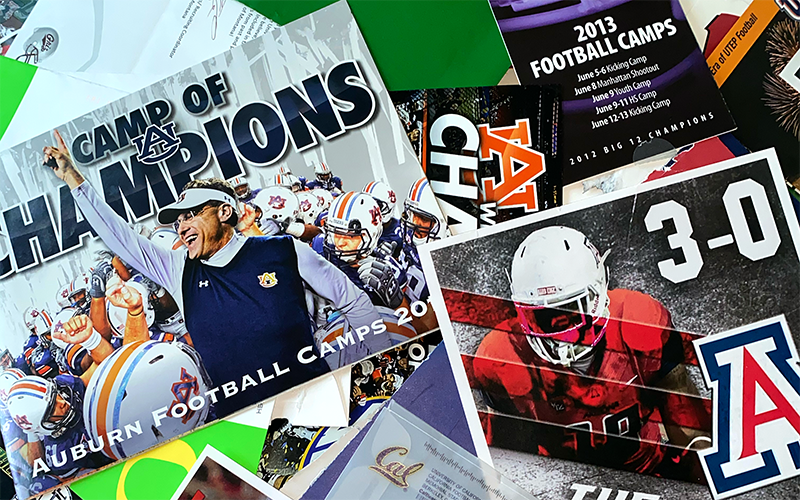
The football recruiting process can be overwhelming to the high school athlete. Technology has stepped in to help the process. (Photo by Rob Kleifield)
TEMPE – New technology aims to bridge the gap between social media and the college football recruitment process. Now, more than ever, players across America have easy access to a pathway that may amplify the odds of reaching the next level.
Just ask former Chaparral and Sunrise Mountain high school standout Elijah Castro, and he’ll confirm that the foremost facet of being recruited isn’t catching passes, it’s snatching eyeballs.
“There’s so much more to football than just going out there on Friday nights and playing,” said Castro, who lived in Peoria his first three years of high school before moving to Scottsdale to join the Firebirds. “The biggest thing is just getting seen, being in front of coaches.”
The current recruiting landscape is saturated with groups and services like Next College Student Athlete, BeRecruited and CaptainU, which convince players and parents they need their aid to get on colleges’ radars.
These helping-hands vary in terms of efficiency, cost and provided features. Some charge families upwards of $1,000 to enter a player’s name into an invisible directory, supposedly outlining prospects for schools in nearby regions. Often, players are congratulated, not for receiving scholarships, but for being added to a school’s recruiting board. There is no exact science, however, that proves the foregoing feat even occurs, and most parents aren’t informed enough to know otherwise.
Enter Signing Day Sports, a tool the company infers could transform players’ and parents’ struggles into saved money, time and optimism – a tool that, realistically, could have significantly altered and extended Castro’s once-promising career on the field.
“I believed in myself,” Castro said. “I believed in the talent I could have provided for any school … but getting in front of the coaches was the hardest thing.”
Castro compiled 4,829 all-purpose yards over his final two seasons of high school football. He crossed the pylon 46 times in that same two-year span. As a senior, Castro was arguably the most dynamic offensive player on a team that advanced to the 2013 Division II Arizona state championship. He threatened to score each time he touched the football, yet he graduated the following spring with zero major college scholarship offers.
“We had a lot of kids who at least wanted to try and make their dreams come true,” Castro said. “The situation I was in was just tough.”
He said his recruitment spiked playing alongside Arizona and Arizona State commits Trevor Wood and Tyler Whiley, as well as a collection of other highly touted underclassmen. Castro called his transfer to Chaparral a privilege that most kids aren’t afforded. But to his disappointment, opportunities regarding his future in a football uniform remained scarce.
The grim reality? Castro endured the same hardships that hundreds of thousands of high school football players across the country encounter each year. The NCAA estimates just 7.3 percent of participating high school football players will compete at the Division I, II or III levels.
That’s approximately 73,750 from a pool of more than one million.
His most obvious flaws? Castro was considerably shorter than his future Division I teammates. He lacked the fifth gear that makes Power Five coaches drool. But, most of all, he wasn’t afforded the exposure that his game warranted because, at the end of the day, coaches – both at the high school and college ranks – must pick and choose which players and prospects bank their time, energy and resources.
“One coach can have over 100 kids on a roster that he’s trying to help get to the college level, and it’s hard, it’s stressful, because after your senior year that coach has to get ready for the following (class),” Castro said. “People don’t realize that head coaches go through a lot. People get mad like ‘why can’t I get this or this, or that?'”
It didn’t necessarily matter that Castro possessed a rare determination, that he was a workout junkie and a respectful student. Standing 5-feet-7 he was largely left behind, despite repeatedly, stealing the spotlight on Friday nights.
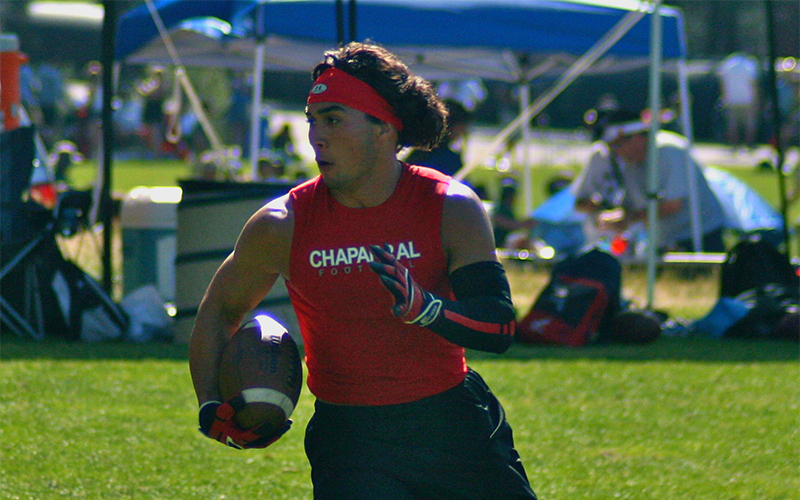
Elijah Castro rushed for 1,345 yards in his lone season at Chaparral High School – the 10th best single-season mark in program history. (Photo courtesy of Elijah Castro)
“There were a lot of great players on both sides of the football that were getting big-time looks,” said Castro, discussing the perks and drawbacks of starring as an undersized slot receiver on a stacked roster. “I was doing everything I possibly could on the field, and everything in the classroom as well. Everything happens for a reason, though.”
Now, Castro has flipped the script and assists high school athletes in their quest to further their football careers as a lead recruiter for Signing Day Sports, which is a platform designed to revolutionize the evaluation process for players and coaches.
“That’s really why I built this thing – to give back and to help the kids get to the next level,” said Dennis Gile, a nationally renowned private quarterback instructor, based out of Arizona, and founder of Signing Day Sports. “To be able to have someone like Elijah, who can come in here and help us and be a salesman for us, he understands it, he gets it, he lived it.”
Very thankful for the opportunity to work with @SigningDaySPRTS and help athletes from all over the country get recruited to the collegiate level! If you are someone that needs help reaching your goals please reach out to me! Strive For Greatness ? pic.twitter.com/y0exKaSfjN
— Elijah Castro (@ElijahCastro21) August 24, 2020
Castro’s phone is on 24/7 so that he can interact with players, coaches and parents, and answer any lingering questions.
“This isn’t a job for me. It’s something that I love to do. It’s my passion,” Castro said. “If I can be a blessing to someone and help get information to a kid who doesn’t have all the resources he needs to be successful, and I can help him, then I did what I’m supposed to do.”
The ultramodern app, offered in both the Apple and Android stores, is not molded from any brazenly expensive recruiting service that – often inconsistently – promotes players’ measurables or film. Instead, it’s a platform catered specifically to athletes and coaches that essentially increases the odds of getting recruited by exhibiting each player’s abilities on a level playing field.
“We’re not a service that tries to push all these emails onto you,” Gile said. “I just love helping kids, man. I grew up in a part of town where we had nothing, and didn’t have help (or) anything like this.”
In a nutshell, Signing Day Sports is precisely that – help. Divided into three separate tiers, the platform is designed to help players get seen; to help high school coaches manage and promote their entire rosters; to help college coaches reach peak efficiency on the recruiting trail.
It doesn’t cost a cent for players to install the app and create a profile, which is then verified and entered into a rapidly growing database. And, for either $30 a month, or $250 per year, players can upload a multitude of measurements, scripted pro-day drills, mock interviews and other customizable assets that college coaches typically gauge during the evaluation process. Best of all, coaches will be drawn to it because it’s totally free for them to use.
“The thing that really sets us apart is the high school coaches platform,” said Gile, adding it’s a feature unlike anything the market has ever seen. “In the past 11 days of our soft launch, we have 17 of the top-25 high schools in the country from MaxPreps that have signed up, or are in the process of signing up their entire roster of kids from freshmen to seniors.”
Among those premier programs is Scottsdale Saguaro and coach Jason Mohns, who has entertained an advisory role by consistently sharing Signing Day Sports content on his social media accounts, demonstrating the simplicity of filming combine drills as a cohesive unit, so that each player on his roster can upload clips to their profiles.
The @SigningDaySPRTS team is doing a zoom tutorial for HS coaches at 2pm AZ time tomorrow. Coaches DM me if you want to jump on and learn more about the App! This is going to revolutionize recruiting for players, high school coaches, and colleges ? https://t.co/iB0YDGklyS
— Jason Mohns (@CoachMohns) July 27, 2020
This creates another avenue for athletes who may fly under the radar, either because they lack the means to travel and afford lodging for camps or campus visits, or because they lack game experience as underclassmen.
And, amid an atypical high school season that will surely feel the effects of the COVID-19 pandemic, whether it’s played to completion or not, its impact could be enormous.
“There’s a dad I spoke to a couple nights ago, and he was like ‘man, my son needs film,'” said Brandon Sanders, former Pueblo High School head football coach and two-time first-team All-Pac-10 performer at the University of Arizona. “‘How can he present himself outside of just the stats, of what you see on MaxPreps?'”
Before, it may have been impossible. The coronavirus spoiled high school football players’ offseason workouts, Sanders said. It has limited progression in preseason camps, and altered the environment for college recruitment, at the very least, for the foreseeable future.
“A lot of coaches were telling me, ‘We’ll come see you in the spring, we’ll come see you practice before the season,'” said class of 2021 running back Jared Williams. “I was looking forward to it.”
Williams is Castro 2.0 on the gridiron, not only because he plays for Chaparral, or wears the same uniform number (#21), but because he is as transcendent with the football in his hands as his forerunner.
During the 2019 season, Williams became the first Firebirds player since 2013 – Castro’s senior year – to eclipse the 1,000-yard mark on the ground. He also was credited with 25 touchdowns.
Williams boasts offers from Northern Arizona and Minot State but said he expected his recruitment to blast off in spring practices, which never materialized due to pandemic shutdowns.
Back-and-forth communication with previously inquisitive coaches, in turn, has slowed down considerably, he said.
“It hurt a lot,” said Williams, listing off several canceled campus visits and college camps he, originally, planned to attend this summer. “I was ready to do all these things that I was telling people I was going to do.”
Those opportunities will never be provided to Williams again.
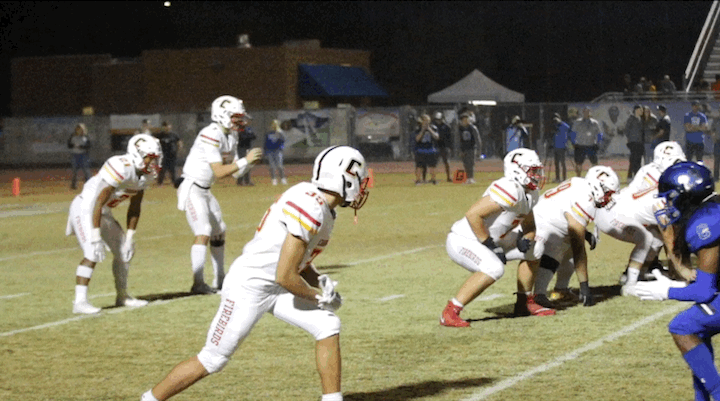
Jared Williams reels in a pass from 2020 graduate, Ohio State quarterback Jack Miller, during Chaparral’s Open Division playoff game versus Chandler High Schoolin November 2019. Williams compiled 315 yards receiving, in addition to 1,034 yards rushing as a junior. (Photo by Rob Kleifield)
“I definitely want to play college football. It’s something that I’ve wanted since I was a little kid,” he said, “I’ve got a lot of people counting on me, expecting me to do big things, and I just don’t want to let them down.”
In other words, a shortened or canceled schedule could spell doom for a senior dependent on putting his latest and greatest abilities on tape, which makes Signing Day Sports not just a catalyst to boost an underrated player’s recruitment in this climate, but, in a lot of respects, a necessity.
“It’s just like God gave us the greatest alley-oop ever,” said Gile, amazed at the timing of Signing Day Sports’ burgeoning spread. “I don’t want (us) to be great because of COVID-19, but I feel like we’ve built something that kind of takes over for the meantime.”
Sanders, who resigned from his post as head football coach at Pueblo in November 2019, likens the platform to a new wave of what he calls old-fashioned recruiting, which helps schools target the best-fits for their program, instead of the highly touted four- and five-star prospects who receive offers from every Power Five team in the country due to a preconceived fear of “missing.”
“Rob Waldrop wasn’t a five-star guy, (and) this guy ended up being an Outland Trophy winner,” said Sanders, reflecting on the Arizona Wildcats defensive recruiting prowess in the ‘90s. “Tedy Bruschi wasn’t a highly recruited guy, but when you put him on film, and then you get a chance to understand who he is, he’s off the charts. He’s a football player.”
The app won’t eliminate or threaten the existence of sponsored recruiting events scattered across the country put on by massive brands such as Nike, Under Armour and Adidas because “money makes the world go round” and there’s plenty of parents willing to pay high prices for increased exposure, Sanders said. But it does fill a void for low-income families, players who dream of competing at the next level and don’t have the resources to turn those dreams into reality.
“I would have had about two or three kids in my years at Pueblo that could have used this and would have got D-I offers,” Sanders said, “I can guarantee you that. … It’s like the NFL. You don’t need everybody to draft you number one, you just need one team to like you.”
That’s why Signing Day Sports, a true one-stop shop, is viewed to be so attractive, Sanders said. It will give more kids more opportunities, and help colleges find those diamonds in the rough, more efficiently. It also makes the job of a high school head coach, if nothing else, a little bit easier.
“When you’re a head coach, you’re the head of that program,” Sanders said. “That means you’re responsible for that JV team and that freshman team, and everything that goes in and out, outside of that. You can spread yourself thin. I’ve seen some coaches, they have to line their own fields…I’m not a gardener. I didn’t know anything about how to plant or seed fields, (but) I had to learn how to do that stuff as well.”
Sanders also believes the platform will provide players and parents a little bit more ownership over recruiting ventures. And, it will help colleges sort, from the palm of their hand, through hundreds of thousands of kids’ data.
“Between the high school and college coaches, we’ve probably had 75 things that we’ve implemented because that’s what we built this thing for, and I can’t reiterate that enough,” Gile said. “This is for these coaches. This is not for us.”
More than 400 institutions, all looking for their next class of football commits, will be onboarded within the next 50 days. By January, the company expects every college football program in the country – from Division-I all the way down to the NAIA level – to utilize the app in their player assessments.
“It’s been a long process, but now that we’ve launched we’re gaining traction,” said Derek Rasmussen, a co-founder of Signing Day Sports. “We have top high school programs and top college programs coming on literally every day.”
The company has already partnered with Microsoft, gaining access to artificial intelligence which plays a critical role in the verification process, and presents different tools that coaches have access to, like a ghost feature that overlays similar prospects’ pro-day drills, simultaneously. The company also plans to meet with some of the largest sports corporations in the world to discuss future business near the end of the calendar year.
We understand how frustrating and how expensive it is to get a student athlete seen and known by a university. We have done what many thought impossible. The new era of recruiting is now. https://t.co/JJLE8AuTXm
— Signing Day Sports (@SigningDaySPRTS) September 10, 2020
“At the very beginning it was just football, but then we saw the power of it,” Rasmussen said. “It’s scalable. We could take it over to other sports easily, now that we’ve got the platform built.”
And, that’s the vision currently intact. People are hustling on the back end to, hopefully, launch a new sport every 60 to 90 days. Baseball is next, then basketball, followed by soccer and softball. Eventually, the goal is to incorporate the world’s 10 biggest sports, so that everyone can thrive under similar circumstances.
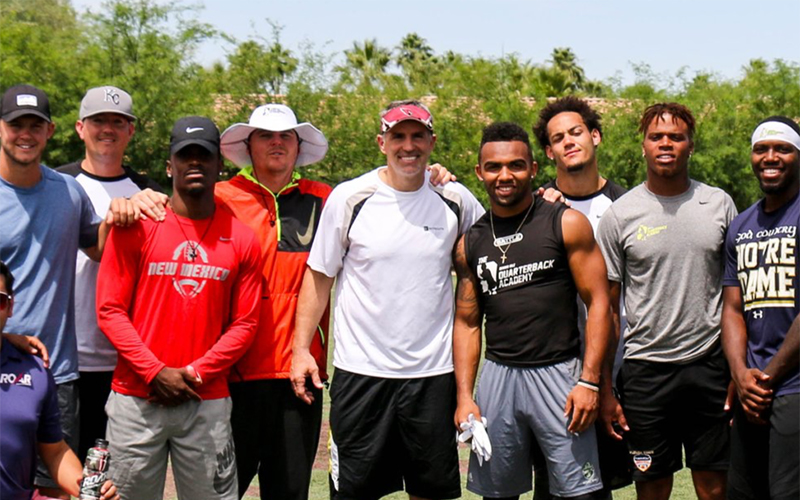
Dennis Gile (white hat) and Derek Rasmussen (grey hat) pose with current and former NFL players during a training session in Arizona in spring 2017, just months before Gile first put pen to paper, outlining his vision for Signing Day Sports. Washington Football Team quarterback Kyle Allen (far left) and Arizona Cardinals wide receiver Christian Kirk (fourth from right) have each recently taken to social media to promote the app. (Photo credit to @TheQBAcademy on Twitter)
The last three years for Signing Day Sports has been a conglomerate journey full of back-tracking, testing and planning. Now, satisfied with its functionality, the company will soon launch an extensive marketing and advertising campaign that will “drop a bomb on some people pretty fast,” Gile said.
Castro’s confidence he would have been a huge beneficiary of Signing Day Sports if it existed years ago, fills the air – it is evident he’s given this hypothetical scenario some thought.
“Every time we talk about that, ‘what if I had this my senior year? What could have happened?'” Castro said, “I kind of get angry with myself because I’m like ‘man, what if Signing Day Sports was there? I honestly don’t think I’d be here right now. … I would have had 25 to 30 offers.”
The scholarships never poured in, though.
So channeling his warrior mentality, Castro continued training, hopeful that some school may present an opportunity to perform between the white lines at a later date. But while preparing for a visit to Boise State in 2015, he snapped his leg in three separate places.
“He could have had his pick of the litter and been able to go where he wanted and got to play, and who knows what would have happened at that point,” Gile said. “I think you have hundreds of thousands of kids in the United States that are like (Elijah), and I’m not just saying that because we want someone to sign up here, so that we make money. I think this truly equals the playing field for every single person in the country…It gives everyone a fair shot to go to the next level.”
Castro plotted his comeback almost a year later, eyeing a walk-on shot at Arizona State, then tore another ligament in his previously reconstructed right leg, effectively marking the end of a carefully crafted, childhood dream.
“When hard times come you just have to keep pushing through, and believing in yourself,” Castro said. “It builds character…it literally built who I am, today.”
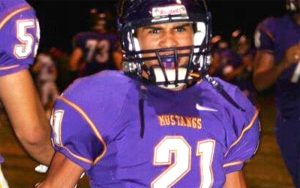
Elijah Castro celebrates one of his many touchdowns as a junior on the Sunrise Mountain football team in 2012. Castro said he cherishes the memories he made at both schools. “I played against some of the best players (in Arizona)…and I had the opportunity to play on ESPN, it was fun,” he said. (Photo courtesy of Elijah Castro)
Unbeknownst to Castro then, it additionally marked the beginning of a greater purpose: helping rising football players succeed in accomplishing their dreams.
“I don’t care what time it is, (they) can ask me questions, call me or whatever. I’m here to help,” said Castro, not surprised at all by the continuous flow of curiosity and absorption on a daily basis. “We’re getting great feedback from all these players because it’s something they’ve never seen before.”
Naturally, of course, the players’ database within the Signing Day Sports app will drive the coaches’ database. And, vice versa. Interest breeds influence in this setting.
“The more and more kids that get on it, guess where the coaches are going?” said Sanders, expressing his team would have implemented the app in a heartbeat. “That’s just the name of the game.”
